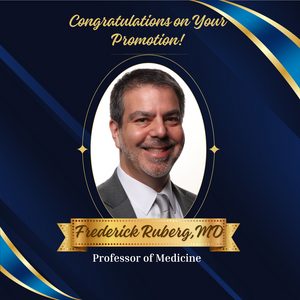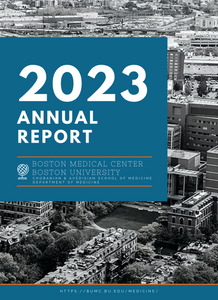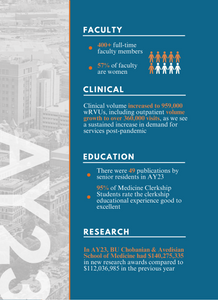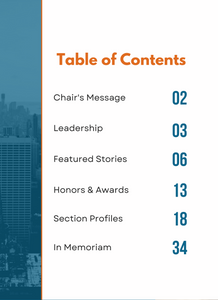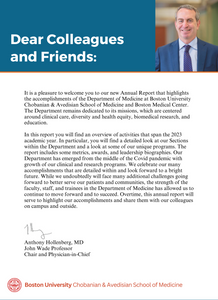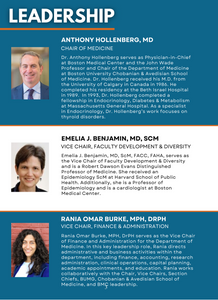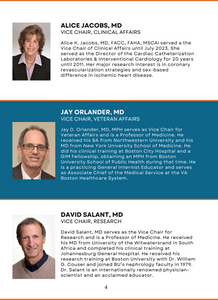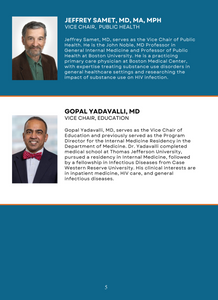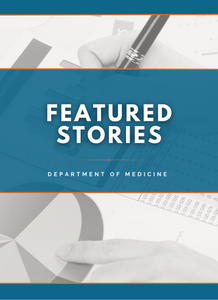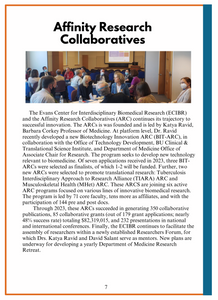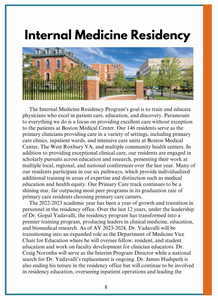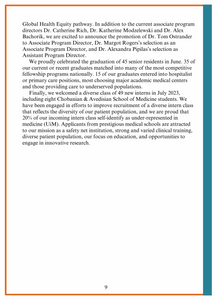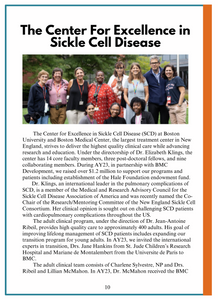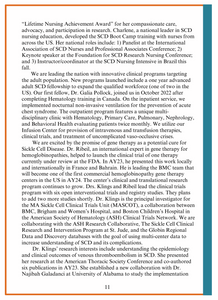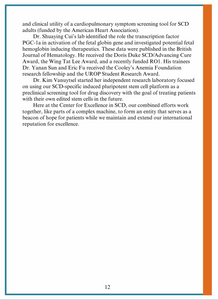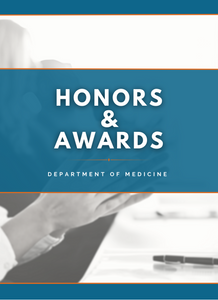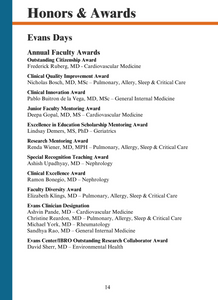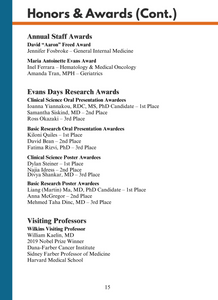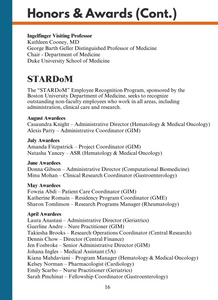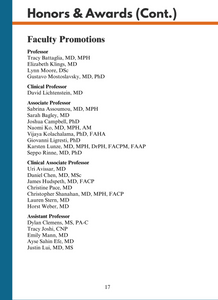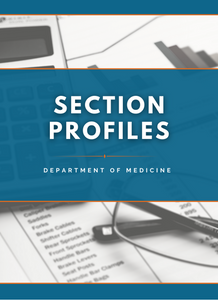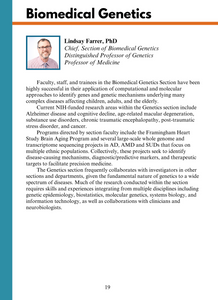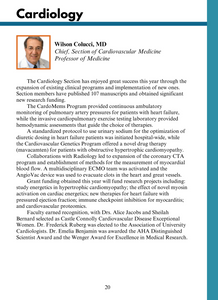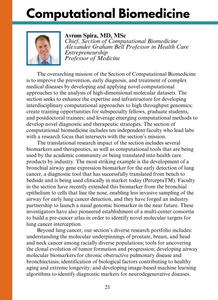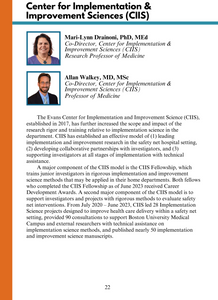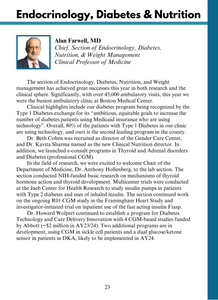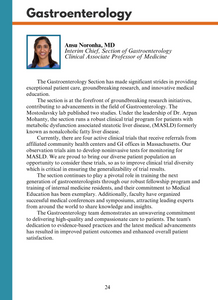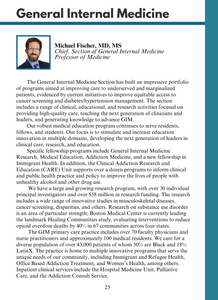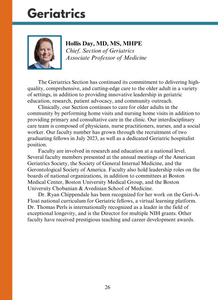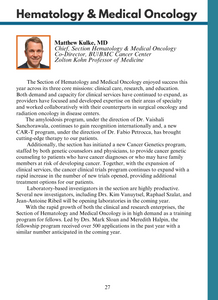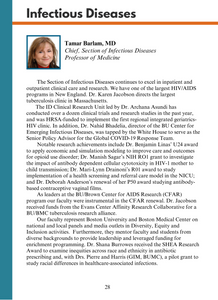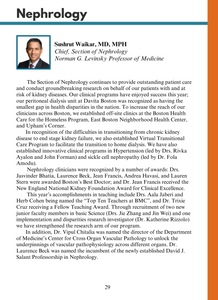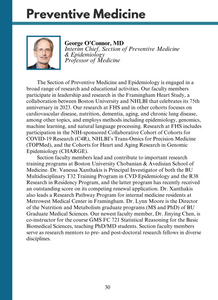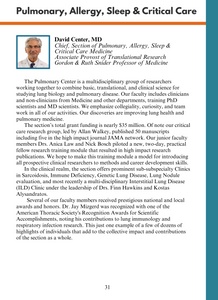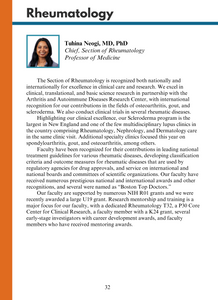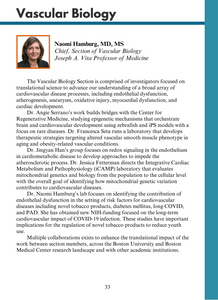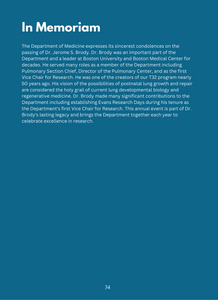DoM Faculty Members Awarded Bridge Funding Through the BMC CSO Office
We are delighted to announce that four DoM faculty researchers have been awarded bridge funding through the BMC CSO Office. We would like to both share their accomplishments with our community and also thank BMC leadership for their commitment to and investment in our research faculty.
Dr. Sarah Bagley, Departments of Medicine and Pediatrics, General Internal Medicine and Pediatric Health Services Research: Dr. Bagley’s research focuses on developing strategies to engage youth who use drugs to minimize overdose risk, reduce complications of drug use, and optimize their health.
Dr. Deepa Gopal, Department of Medicine, Cardiology: Dr. Gopal’s research focuses on identifying and potentially preventing heart failure with preserved ejection fraction.
Dr. Elliott Hagedorn, Department of Medicine, Section of Hematology & Medical Oncology and Associate Member, Center for Regenerative Medicine: Dr. Hagedorn’s research focuses on understanding the molecular mechanisms by which blood and immune cells migrate in and out of specific tissues, with the goal of translating the basic research into clinical therapies for treating human diseases.
Dr. Gene Kwan, Department of Medicine, Cardiology: Dr. Kwan’s research focuses on enhancing equitable care delivery and use of health services for cardiovascular diseases in rural low-income countries.
AY23 DoM Annual Report
James Hudspeth, MD FACP Selected to Serve as the Next Vice Chair of Clinical Affairs
We are pleased to announce James Hudspeth, MD FACP as the next Vice Chair of Clinical Affairs for the Department of Medicine. Dr. Hudspeth will begin in this role in November 2023.
In his roles as Medical Director of the General Medicine Inpatient Teams and subsequently Associate Director of the Hospital Medicine Unit, Dr. Hudspeth has led a range of initiatives to improve patient care and the educational experience in the inpatient context. Notable efforts include work around regionalizing inpatient care teams to improve patient care, the development of graded autonomy teams for late-year interns in internal medicine, supporting the rollout of an ED boarder program at BMC, and multiple efforts to change the inpatient team structure to better support education including serving as an Associate Program Director of our training program. Critically he led many of our efforts in the organization of our ward teams during the acute phases of the COVID-19 pandemic. Recently, Dr. Hudspeth was selected to lead the Ravin Davidoff Executive Fellowship in Health Equity at BMC.
Dr. Hudspeth is a model faculty member and clinician. He was an inaugural recipient of the ‘Excellence in Care Award’ from the Boston University Medical Group in 2017, and subsequently the inaugural recipient of the ‘Provider of the Year Award for Hospital Wards’ from the BMC Department of Nursing. He received a ‘Gold Society Humanism in Care Award’ in 2021 from BUSM and was promoted to Clinical Associate Professor of Medicine in 2023.
As Vice Chair of Clinical Affairs Dr. Hudspeth will lead our efforts to grow and enhance the capabilities of all Departmental clinical programs ensuring the best use of space and resources to meet the growing needs of patients at Boston Medical Center and in the communities we serve.
DoM Faculty Promotions – May – July 2023
Congratulations to the following Department of Medicine Chobanian & Avedisian School of Medicine faculty on their recent appointment or promotion.
Professor
Frederick Ruberg, MD, Medicine/Cardiovascular Medicine and Radiology, is associate chief for cardiovascular medicine at Boston Medical Center (BMC) and a clinical scientist with expertise in cardiac amyloidosis with continuous funding since 2005. He senior authored a number of important consensus guidelines statements relative to cardiac imaging, cardiac amyloidosis management and cardiac amyloidosis imaging/diagnosis. He currently is multi-PI of the $7.2M NHLBI-R01 funded Screening for Cardiac Amyloidosis with Nuclear Imaging in Minority Populations (SCAN-MP) study. An expert in cardiac imaging, Dr. Ruberg is senior associate editor of Circulation: Cardiovascular Imaging and a Fellow of the American Heart Association. In 2017 he was recognized as the outstanding research mentor by the BMC Medicine house staff, and in 2022 recognized with the Outstanding Citizen award from the department of medicine. A member of the BU Clinical and Translational Science Institute (CTSI) leadership team since 2016, he presently directs research workforce development activities for the Medical Campus. In 2022 he was elected to membership in the Association of University Cardiologists.
Associate Professor
Sabrina Assoumou, MD, MPH, Medicine/Infectious Diseases, is a physician-scientist and the inaugural Louis W. Sullivan, MD, Professor of Medicine. She is a thought leader in research focused on infectious diseases complications of substance use including hepatitis C and HIV. Her research uses health economics including cost-effectiveness analysis to inform guidance panels on the best approach to improve the uptake and implementation of evidence-based interventions. She also works on developing evidence-based interventions to improve outcomes. Her findings have been included in recommendations by national guidance panels such as the Centers for Disease Control and Prevention and the Infectious Diseases Society of America. She has received research honors that include the school’s Evans Junior Faculty Research Merit and Evans Investment awards and the Massachusetts Infectious Disease Society’s Finland Award for Research Excellence as well as teaching awards, including Boston Medical Center’s Excellence in Teaching Hospital-Based Faculty Award and the school’s Distinguished Faculty of the Month, April 2020.
Matthew Nayor, MD, MPH, Medicine/Cardiology, is a physician-scientist and cardiologist with subspecialty training in advanced heart failure and transplantation. He is a previous recipient of the school’s Aram V. Chobanian Distinguished Assistant Professorship. Dr. Nayor’s research uses physiologic studies and cardiovascular epidemiology to focus on the intersection of metabolic health and cardiovascular disease, especially heart failure with preserved ejection fraction (HFpEF). His NIH-funded laboratory is engaged in examining individual responses to discrete physiological perturbations, such as dietary stress or exercise, as precision phenotypes of impaired reserve capacity. By combining these assessments with high-throughput molecular screens (metabolomics, proteomics), Dr. Nayor’s laboratory has the ultimate goals of furthering understanding the underlying pathobiology, improving risk stratification, and potentially identifying novel therapeutic targets.
Andreea Bujor, MD, PhD, Medicine/Rheumatology, is a rheumatologist-scientist who focuses her research on the role of myeloid cells in scleroderma pathogenesis and cardiac fibrosis. She has made a major contribution in her field by identifying Fli-1 as a key player in cardiac fibrosis with an h-index of 14. She is currently a PI on an R01 and a grant from the National Scleroderma Foundation, in addition to being site PI for the Scleroderma Clinical Trials Consortium study. Dr. Bujor also serves as associate director for the rheumatology fellowship and has established and organized an institutional scleroderma biorepository of patient and control skin biopsies and blood samples linked to a clinical database.
Shuaiying Cui, PhD, Medicine/Hematology & Medical Oncology, specializes in sickle cell disease. His work has elucidated new mechanisms for the induction of fetal hemoglobin and has tremendous therapeutic potential. He is PI on an R01 and PI on five other grants from foundations and industry. Dr. Cui has served on several editorial boards and is currently associate editor of Frontiers in Hematology.
Clinical Associate Professor
James Hudspeth, MD, Medicine, is a clinician educator with expertise for learners at every stage of training. He has taught Introduction to Clinical Medicine for nine years and Return to the Clinic for eight years for MD/PhD students. Since 2018 he has supervised and taught third- and fourth-year medical students during their inpatient rotations and served as a field specific advisor for students applying into internal medicine since 2018. In his roles as medical director of General Medicine Inpatient Teams and associate director of the Hospital Medicine Unit, Dr. Hudspeth has led a range of initiatives to improve patient care and the educational experience in the inpatient context. During the COVID-19 pandemic he organized the ward teams, coordinating the efforts of his residents, medicine faculty and more than 100 residents and faculty outside of the department of medicine to expand the medicine teams’ coverage to match the surge of need.
Ryan Chippendale, MD, Medicine/Geriatrics, is a clinician-educator who serves as the geriatric medicine fellowship program director, geriatric oncology fellowship co-director and core faculty and the geriatrics subspecialty education coordinator for the internal medicine residency program at Boston Medical Center. She co-founded and co-directs a national virtual education platform, GERIAtrics Fellows Learning Online and Together (Geri-a-FLOAT). This curriculum delivers critical, but underrepresented, topics in geriatric medicine, including social determinants of health and health inequities to an international audience of learners. Clinically, she cares for complex, frail older adults in home care, geriatric assessment clinic and inpatient.
Rachel Stark, MD (CAMED’02), MPH, Medicine/GIM, joined BU in 2022 and is based at VA Boston Healthcare System where she cares for the frail and aging veteran population in its Home-Based Primary Care Program. Dr. Stark has served in various roles in primary care and medical education leadership, most recently as the director for the Internal Medicine Residency Program at Cambridge Health Alliance and instructor of medicine at Harvard Medical School. During her 11 years at Harvard Medical School and Cambridge Health Alliance, she won multiple awards for her excellence in teaching, mentoring and leadership. Most notably, she won the Young Mentor Award at Harvard Medical School in 2019. She also was honored as the Medical Educator of the Year by the New England Region of the Society of General Internal Medicine in 2014.
DoM Highlights of AY23
As we begin the 2023-24 academic year, we continue to celebrate the school’s 175th anniversary with a variety of activities this calendar year. The following are notable highlights of the 2022-23 school year:
Faculty Honors
Emelia Benjamin, MD, ScM, received the American Heart Association’s 2022 Distinguished Scientist award. She also received the 2023 Wenger Award for Excellence in Medical Research from WomenHeart, the National Coalition for Women with Heart Disease, for her commitment to improving the lives of women living with or at risk for heart disease as well as her countless peer-reviewed articles on cardiovascular disease that have contributed greatly to women’s heart health, particularly to the knowledge of atrial fibrillation.
David L. Coleman, MD, emeritus professor of Medicine, was elected chair of the ABIM Foundation. The Board oversees the Foundation’s efforts to advance medical professionalism, and members are national health care leaders, several of whom currently serve or have served on ABIM’s Board of Directors. Additionally, Coleman received the 2023 Larry Zaroff Man of Good Conscience Award, which is presented annually to a man who has been a champion and supporter of women in medicine.
Karsten Lunze, MD, MPH, DrPH, assistant professor of medicine, received an honorary professorship from David Tvildiani Medical University (DTMU) in Tbilisi, Georgia.
Joseph P. Mizgerd, ScD, the Jerome S. Brody, MD, professor of pulmonary medicine and director of the Pulmonary Center, received the annual American Thoracic Society’s Recognition Award for Scientific Accomplishments. The honor recognizes outstanding scientific research contributions in basic or clinical arenas to enhance the understanding, prevention and treatment of respiratory disease, critical illness, or sleep disorders, while acknowledging exemplary professionalism, collegiality and citizenship through mentorship and scientific involvement in the ATS community.
Titilayo Omolara Ilori, MD, MSc, assistant professor of medicine, was one of 50 recipients of the young investigators award from the American Society for Clinical Investigation. The award recognizes physician-scientists who are early in their first faculty appointment and have made notable achievements in their research.
Elizabeth N. Pearce, MD, MSc, professor of medicine, received the 2023 American Association of Clinical Endocrinology’s Hossein Gharib Educational Lectureship.
Katya Ravid, DSc, Barbara E. Corkey Professor of Medicine, was elected Fellow of the American Heart Association.
Carl G. Streed, MD, MPH, FACP, FAHA, an assistant professor of medicine, received the 2023 Excellence in LGBTQ Health Award (Physician) from the American Medical Association (AMA) Foundation Board of Directors. This annual award honors physicians who represent the highest values of altruism, compassion and dedication to patient care.
Research Publications
Our faculty continue to receive significant mainstream media coverage for their exceptional published research.
- Dr. Shanshan Sheehy’s research on higher levels of perceived racism linked to increased risk of heart disease in Black women was presented at the 2023 AHA Epidemiology, Prevention, Lifestyle & Cardiometabolic Health Scientific Session.
- Dr. Nicholas Bosch’s study in JAMA Internal Medicine found patients with septic shock benefit from a combination of hydrocortisone-fludrocortisone therapy.
- Dr. Stefano Monti’s study in eBiomedicine found centenarians possess unique immunity that helps them achieve exceptional longevity.
New Research Grants: Here are our Academic Year 2023’s largest new grants:
| PI | $ millions | Title: all NIH funded except two marked Gates & Hughes | |
| Felson & Neogi | 46.0 | Osteoarthritis, pain and function | |
| Perls | 16.4 | Protective profiles in centenarians; preventive and therapies | |
| Palmer & Bertrand | 10.8 | Causes of Cancer in Black Women | |
| Nayor | 5.8 | Proteomic Profiling of Exercise phenotypes | |
| Au | 5.0 | Maximizing interoperability across multiple data types (Gates) | |
| Griffiths & Mühlberger | 4.9 |
|
|
| Lenburg & Beane | 4.6 | BU-UCLA Lung Cancer Biomarkers | |
| TCW | 3.9 | Dysregulation induced by APOE4 (Alzheimer’s ) | |
| Schon | 3.9 | Perceived racism, cardiovascular disease risk, & cognitive aging | |
| Wolozin & Zhang | 3.9 | N6-methyladenosine modified RNA in Alzheimer's disease |
Foundation awards of note:
- The Howard Hughes Medical Institute awarded $13,649,882 for research to advance RNA-based antiviral therapies to Drs. Elke Mühlberger, Daniel Cifuentes, Anthony Griffiths, and Gustavo Mostaslavsky.
- The Bill & Melinda Gates Foundation awarded $3,004,907 for infectious diseases research to Elke Mühlberger, PhD
- The American Cancer Society renewed its institutional research grant of $480,000 for pilot grants for 12 early-career cancer researchers to Julie Palmer, ScD, Co-director of the BU-BMC Cancer Center.
- The Rheumatology Research Foundation awarded Assistant Professor of Medicine Reza Jafarzadeh, DVM, MPVM, PhD, $400,000, for research to advance the identification of people with osteoarthritis.
- The American Heart Association awarded $344,000 to Katya Ravid, DSc, Barbara E. Corkey Professor of Cardiovascular Medicine and Professor of Biochemistry & Cell Biology, to study chronic stress and heart disease in a diverse group of breast and prostate cancer survivors.
DoM Researchers Discover Novel Approach for Rebuilding, Regenerating Lung Cells
The Department of Medicine Researchers discover novel approach for rebuilding, regenerating lung cells. Researchers from the Center for Regenerative Medicine (CReM), a joint venture between Boston University and Boston Medical Center, have discovered a novel approach for engrafting engineered cells into injured lung tissue. Read more on the Medical Xpress Website.
Congratulations to Our August STARs!
Join us in congratulating the August STARs!
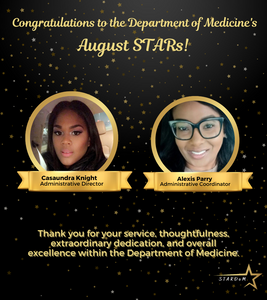
Get to Know Anthony Hollenberg, MD, Chair of Medicine
Since joining BMC in 2022, Dr. Anthony “Tony” Hollenberg, MD, has made it his goal to improve health care and empower our patients and communities. “That’s what we’re all about here at BMC, making our care more accessible,” Hollenberg says.
Watch the short video where the Canadian-native reflects on BMC’s deep commitment to equity, access, and clinical and operational excellence, and why he joined the organization to lead the Department of Medicine last year.
Mark Your Calendars: Evans Days 2023!!
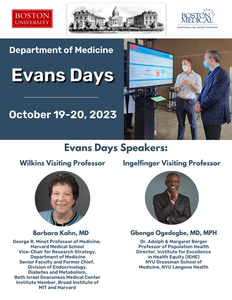
Congratulations to Dr. Frederick Ruberg – Promotion to Professor
Join us in congratulating Frederick Ruberg, MD on his promotion to Professor of Medicine! Learn more about his work here.